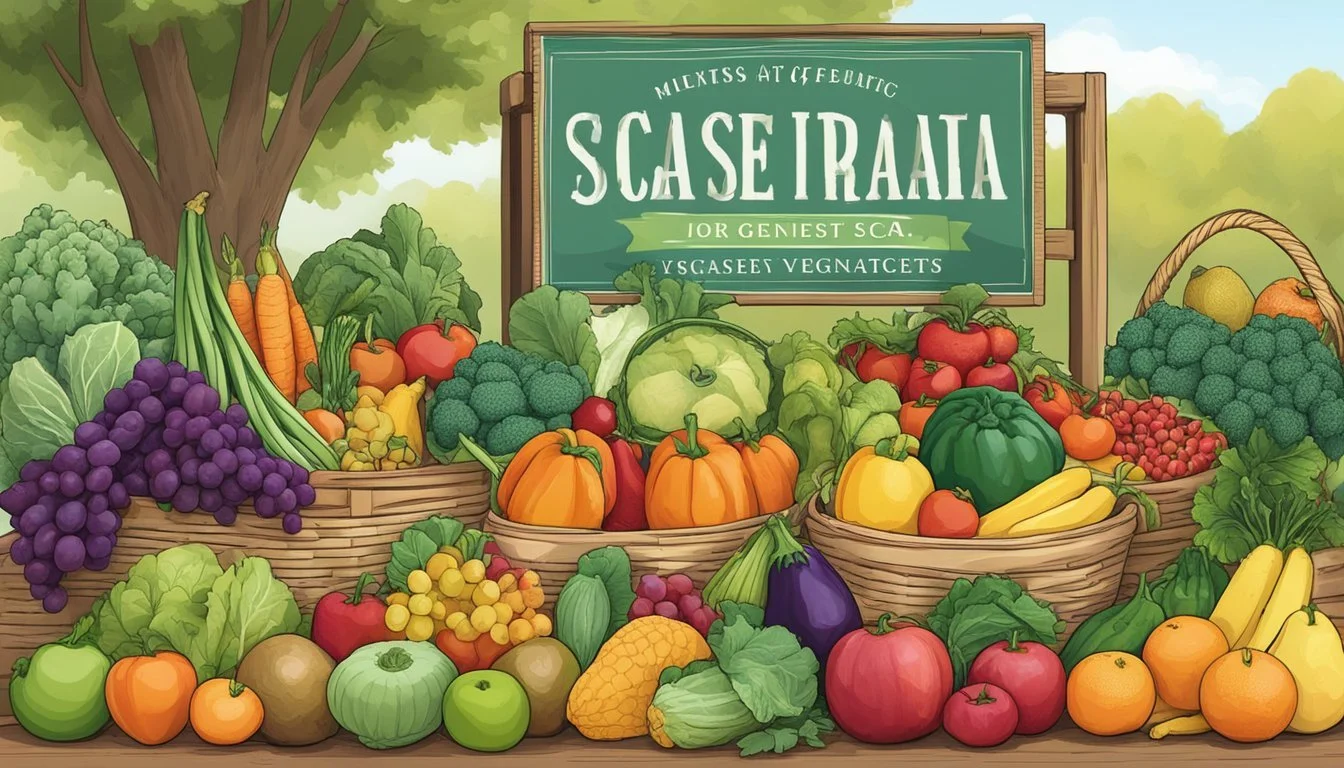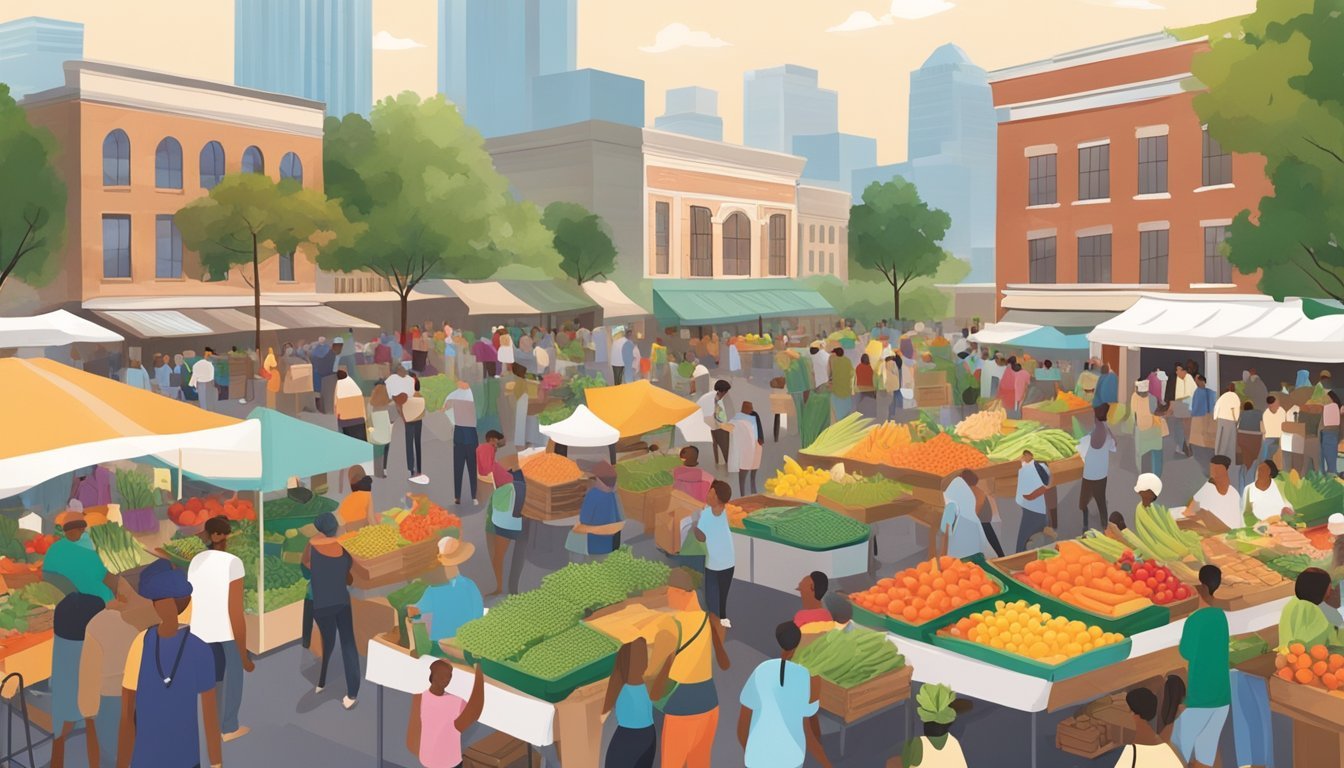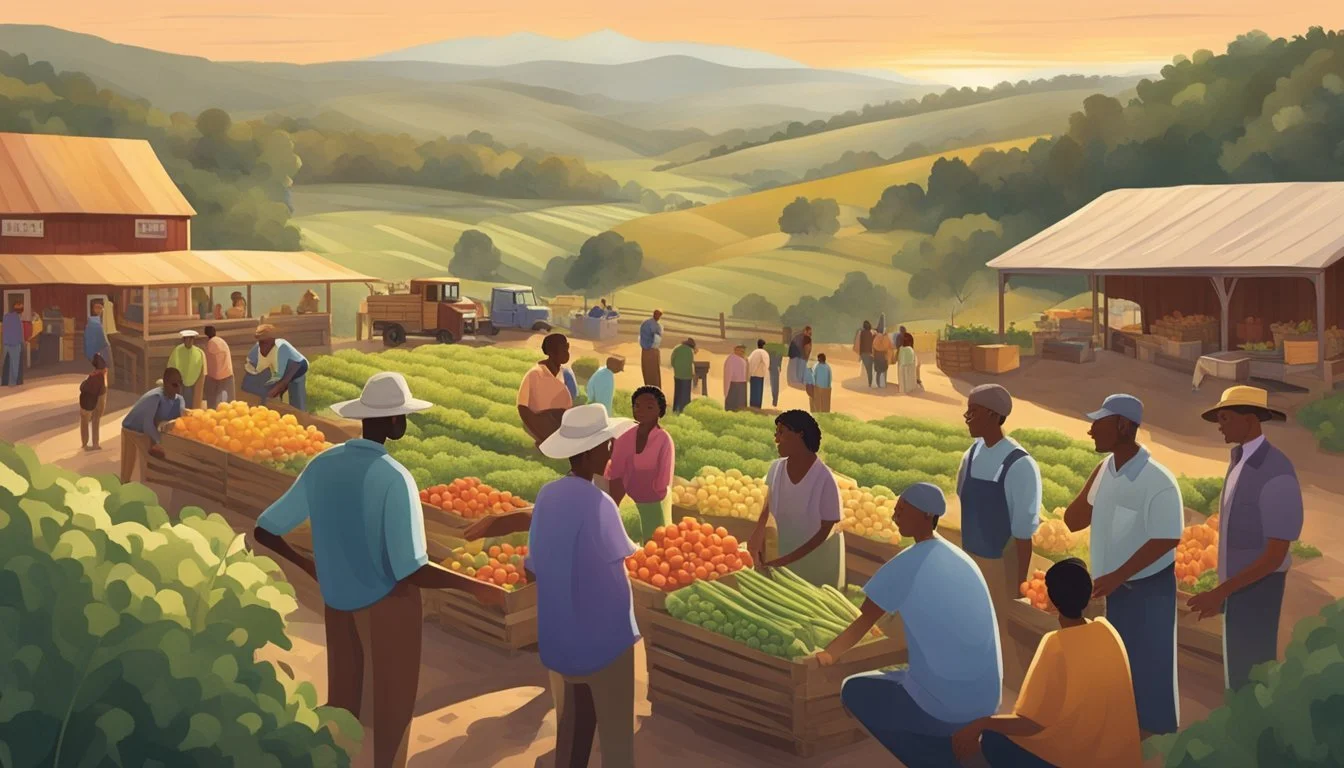Community Supported Agriculture (CSA) in Atlanta, GA
A Guide to Local Farm Partnerships
Community Supported Agriculture, commonly known as CSA, is a model of food production and distribution that connects farmers directly with consumers. In Atlanta, GA, this model has seen significant growth as residents seek fresher, locally-sourced produce and products. Through CSA programs, consumers in the Atlanta area subscribe to receive a regular share of the harvest from nearby farms, which often includes a variety of vegetables, fruits, and additional offerings such as eggs, dairy, and bread. This system benefits both local farmers, by providing them with upfront capital and guaranteed sales, and consumers, by offering access to fresh, seasonal foods while also engaging them in the local food system and seasonal eating habits.
The CSA concept is deeply entwined with values such as sustainability and fair earnings for farmers, underpinning a wider movement towards organic and sustainable growing methods. Atlanta's CSA landscape is rich and diverse, with over fifty growers and producers working in cooperation in West Georgia and East Alabama to deliver a wide array of produce to members. Farms such as Serenbe Farms, an intensive certified organic operation, play a crucial role in the city's CSA fabric, growing an impressive array of vegetables, fruits, flowers, and herbs.
Moreover, Atlanta's commitment to local agriculture is evident through educational initiatives and urban agriculture projects like the Truly Living Well Center for Urban Agriculture, which emphasize the importance of community participation in agriculture. They provide CSA memberships and, in doing so, encourage city dwellers to share in both the risks and rewards of farming. As such, CSA members are not merely customers, but active participants in the support and sustainability of local farms, fostering a sense of community around food production and consumption in the Atlanta region.
Benefits of Joining a CSA
Community Supported Agriculture (CSA) provides tangible advantages to Atlanta residents by offering access to high-quality, locally-sourced products while fostering sustainable practices.
Fresh and Organic Produce
CSA members enjoy seasonal produce that's harvested at peak ripeness, ensuring the fruits and vegetables they receive are not only fresh but also packed with flavor. In Atlanta, CSAs such as Little Fox Farm offer a range of organic produce options, reflecting a commitment to organic practices that avoid the use of synthetic pesticides and fertilizers, which benefits both the environment and consumers' health.
Supporting Local Agriculture
Joining a CSA strengthens local economies by providing direct financial support to farmers. This system helps keep small farms like Love is Love Farm operational, enabling them to continue supplying the Atlanta community with local food while also preserving the agrarian landscape of Georgia.
Environmental Responsibility
Sustainable agriculture practices are central to most CSA programs. By choosing a local CSA, members support farming methods that aim to improve soil health, reduce water usage, and lower carbon footprints through minimized food transportation distances and composting efforts.
Economic Advantages
CSA subscriptions can offer economic benefits for both members and farmers. Members often receive a better price per unit of produce, while farmers benefit from a guaranteed market for their farm products. This model ensures economic stability in the local farming community and keeps money within Georgia.
Health and Nutrition
The produce members receive from their CSA is typically more nutritious because it's harvested when its nutrient content is highest. Access to a variety of fresh food can promote better eating habits and overall health among Atlanta residents.
Community Engagement and Education
CSAs create a relationship between farmers and members that transcends a simple transaction. Members may have the chance to ask questions, visit the farms, engage in agritourism events, and learn more about where and how their food is grown, leading to greater appreciation and stewardship of the local environment and agriculture community.
How CSAs Work
Community Supported Agriculture (CSA) in Atlanta connects residents with fresh, locally sourced food directly from farmers. Participants buy "shares" of a farm's production and receive regular allotments of seasonal produce, exemplifying a mutual commitment between consumers and growers.
Understanding CSA Shares
A CSA operates on a share system where consumers purchase a membership to the farm's upcoming harvest. These shares typically include a variety of vegetables, fruits, herbs, flowers, and can also feature meat, eggs, dairy, and bread. The exact contents of a share depend on what the farm produces.
The Role of the Farmer
The farmer commits to growing high-quality produce for the duration of the farming season. They plan the production, tend to the crops, and harvest the seasonal produce. Atlanta farmers may specialize in heirloom varieties, incorporate sustainable practices, and offer options like pasture-raised meats and artisan cheese.
Seasonality and Variety of Produce
Shares reflect the seasonal nature of farming, offering items like tomatoes and greens at their peak availability. Variety is celebrated, as a single CSA may distribute over 300 different varieties of produce, giving members the chance to experience new flavors and recipes.
Membership Commitment and Pickup
Members commit to a season-long subscription, supporting the farm financially in exchange for a reliable source of fresh produce. Pickup of CSA shares is typically done at designated locations such as the farm, urban farm sites, or local farmers markets.
Distribution of Produce
An essential aspect of the CSA model is the way produce is distributed. Members receive weekly or bi-weekly allotments presented in boxes or bags, and larger CSAs might enable options for customization of the items included in their share.
Financial Aspects and Support
By purchasing a share, members provide economic support upfront, which helps farmers cover initial production costs. This model fosters community support for local agriculture and provides financial security for farmers. The cost of shares reflects both the quality and quantity of produce members will receive, as well as the peace of mind knowing where their food comes from.
Finding a CSA in Atlanta
For Atlantans seeking fresh, locally-grown produce, joining a Community Supported Agriculture (CSA) program is a promising option. They can connect with local farmers, partake in the urban agriculture movement, and enjoy the nutritional benefits. Here's how to find a CSA in Atlanta.
CSA Directory and Networks
Local CSA directories are an excellent place to start for those looking to join a CSA program in Atlanta. Edible Atlanta and LocalHarvest offer comprehensive lists of options where individuals can find everything from Bread & Butter Farm's fresh offerings to Serenbe Farms' certified organic variety. These directories provide detailed information on CSA shares, seasonal availability, and signup processes.
Farmers Markets and Local Farms
Farmers markets are not only venues for purchasing fresh goods but also hubs for CSA information. With a presence in many Atlanta neighborhoods, markets often host local farms such as Riverview Farms and Wrecking Barn Farm, where one can sign up for CSAs on-site. Visiting these markets grants insight into various CSA programs and allows direct engagement with the farmers.
Atlanta Farmers Markets Known for CSAs:
Peachtree Road Farmers Market
East Atlanta Village Farmers Market
Grant Park Farmers Market
Urban Farm Initiatives
Atlanta's urban farms, like Truly Living Well and Freewheel Farm, offer CSA shares, embodying sustainable agriculture within the cityscape. These farms frequently turn into community spaces offering CSA packages and invite city dwellers to explore urban farming practices.
Notable Atlanta Urban Farms Offering CSA:
Truly Living Well Center for Urban Agriculture
Freewheel Farm
Farm Visits and Agritourism
Agritourism events and farm visits, such as those offered by Serenbe Farms, provide an opportunity to experience farm life and learn about CSA programs first-hand. Farm tours can be a family-friendly way to engage with agriculture and might include hands-on activities or seasonal celebrations.
Agritourism Spots with CSAs:
Serenbe Farms
Urban Sprout Farms
Online Platforms and Social Media
Prospective CSA members can leverage online platforms and social media to find local CSA options. Farms utilize their online presence on platforms like CSAware to provide easy access to program details and online sign-ups. Social media channels give real-time updates, customer experiences, and interactive sessions with farmers.
Social Media Platforms to Follow:
Facebook Groups dedicated to Atlanta CSAs
Instagram profiles of local farms
Community Workshops and Events
Atlanta's community events and educational workshops offer avenues to learn about CSAs and meet farmers. Entities like the Atlanta Community Food Bank organize events that sometimes feature CSA sign-up opportunities, while workshops provide insights into the origins and operations of CSAs, sustainable practices, and seasonal cooking.
Workshops and Community Events to Consider:
Atlanta Local Food Initiative Workshops
Annual Atlanta CSA Fairs
Challenges and Considerations
In Atlanta, GA, CSA models confront a range of challenges and considerations, from climate-related issues to sustaining farmer livelihoods. These factors are central to maintaining productive and mutually beneficial CSA systems.
Weather and Seasonal Changes
Atlanta's climate presents weather challenges such as extreme heat, drought, and sporadic frost, all impacting crop yields. CSAs must adapt to these conditions, often requiring seasonal adjustments in the variety and availability of produce. Farmers employ strategies like cover cropping to manage soil health during adverse weather and ensure a continuous supply of seasonal food.
Sustainable Farming Challenges
Sustainable farming practices are essential to CSA values but come with their own set of challenges, including disease management and soil preservation. Implementing organic methods such as crop rotation and natural pest control can be more labor-intensive and may not always align with conventional expectations of productivity.
Consumer Expectations and Education
Maintaining a strong relationship with members involves education on the benefits and realities of CSA participation. There is a need to set realistic expectations about seasonal food availability and the importance of supporting sustainable practices. Further, market-style CSAs where consumers choose their produce might require additional guidance to prevent over or under-selection.
Regulations and Certifications
CSAs aiming to be recognized as certified organic farms must adhere to stringent regulations. This involves periodic inspections and detailed record-keeping to ensure compliance with organic standards, which can be both time-consuming and costly for farmers.
Economic Sustainability for Farmers
The economic aspects of running a CSA include fair compensation for farmers and affording the costs associated with sustainable methods and farm economics. Balancing the finances to ensure economic sustainability for both the farmers and the members is a key consideration, often requiring innovative approaches to share costs and risks.
By addressing these challenges, Atlanta's CSAs can continue to support local agriculture and provide fresh, organic produce to their communities.
Community Impact
Community Supported Agriculture (CSA) programs in Atlanta, GA, have multifaceted impacts on local communities ranging from economic benefits and cultural enrichment to environmental conservation and health promotion.
Strengthening Local Economies
Atlanta's CSAs contribute significantly to the local economy by supporting over 50 growers and producers in West Georgia and East Alabama. They use sustainable farming methods and believe in fair earnings for farmers. Consumer investment in CSAs fosters a circular economy, keeping money within the community and bolstering economic stability.
Social and Cultural Diversity
CSA programs in Atlanta enhance the city's diversity, offering produce from a variety of cultures which attracts a wide consumer base. The inclusion of refugee communities in CSA initiatives brings an exchange of agricultural traditions and creates a tapestry of social and cultural experiences.
Educational Opportunities
Atlanta's community-supported farms often host educational workshops and agritourism events. For example, Serenbe Farms provides insight into the farming of over 50 different vegetables, fruits, flowers, and herbs, educating the community on agricultural diversity and practices.
Boosting Local Agriculture Awareness
CSA initiatives boost awareness of local agriculture by connecting consumers directly with the source of their food. The broad variety of produce offered, including fruits, vegetables, eggs, meat, and dairy, raises consumer consciousness about the seasonal and sustainable aspects of farming.
Environmental Conservation Efforts
By using organic and sustainable growing methods, CSAs in Atlanta play a critical role in environmental conservation efforts. They help preserve soil quality and promote biodiversity, aligning consumer choices with ecological responsibility.
Health and Nutrition Awareness
CSA subscribers receive a range of fresh, nutritious foods that contribute to health and wellness. The presence of local CSAs emphasizes the importance of nutrition education and offers opportunities for the community to learn about the benefits of consuming fresh, local produce.
Supporting CSAs Beyond Membership
Support goes beyond financial contributions to CSAs in Atlanta; community engagement and advocacy play crucial roles in the sustainability and growth of local agriculture.
Volunteering and Community Work
Community Supported Agricultures (CSAs) in Atlanta thrive on volunteer efforts. Individuals can contribute their time and skills to various aspects, from helping during harvest to aiding in distribution. Volunteering fosters a deeper connection between consumers and their food sources, and can provide vital manpower during peak seasons for local farms.
Advocacy and Word of Mouth
Advocacy is key to CSA success. CSA members and enthusiasts are encouraged to spread awareness through word-of-mouth, sharing their experiences and the benefits of local produce with others, thus bolstering support within the community. This organic spread of knowledge greatly assists in building a more robust customer base for Atlanta's CSAs.
Participation in Events and Workshops
Engagement in CSA-organized events and workshops is another avenue of support. These gatherings are not only educational but also promote community spirit. They may include cooking classes, farming seminars, or even tours of the farms, providing opportunities for members to learn and socialize.
Financial Donations and Sponsorships
Financial support need not be limited to purchasing shares. Donations and sponsorships can further aid CSA programs in Atlanta, allowing them to innovate, expand, and maintain affordability for all community members. Such financial patronage can be a lifeline, especially for smaller, start-up CSAs.
Promoting Local Agriculture Policies
Supporters can influence local policies to favor local agriculture and CSAs. By engaging with policymakers and advocating for supportive legislation, individuals help create an environment where CSAs can prosper. This includes policies that facilitate land access, provide subsidies for sustainable practices, or offer tax incentives for both farmers and consumers.








